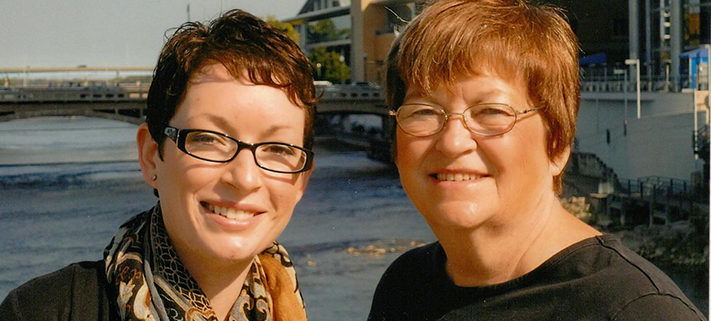A story of God’s grace
An author shares her amazing life story, a story that can’t be told without talking about God’s grace.
Julie K. Wietzke
They said they only made some “minor” edits.
When an international publishing company contacted Mahtob Mahmoody about printing her memoir, My name is Mahtob, the editors mentioned they made a few changes—they wrote God out of the book. It seems there were no words in their language to express the concepts of God’s will and God’s grace.
Needless to say, Mahtob, a WELS member from Michigan, disagreed with the edits. “You can’t tell the story of my life without God’s will and God’s grace,” she says. “That’s a part of it. That’s a part of all of our lives.” So those changes were discarded.
That grace is apparent throughout the book and throughout her life—a blessing she feels she shares with every Christian. “God is gracious, and he does have a plan for us,” she says. “He is taking care of us in big ways and in small ways every day.”
Many have heard a part of Mahtob’s story from the book Not Without My Daughter, written in 1987 by Mahtob’s mother, Betty. The book recounts the story of how Dr. Sayed Mahmoody, Betty’s husband and Mahtob’s father, took them for a two-week trip to visit his family in Iran. That trip led to spousal abuse, an 18-month imprisonment for Betty and six-year-old Mahtob, a harrowing escape, and their journey back to the United States.
While that book closed one chapter of their lives, it was just the start of their spiritual journey.
While Betty grew up Christian and went to church with neighbors as a child, she wasn’t active in organized religion as an adult. But fearing that her husband would kidnap Mahtob after their escape back to the United States, Betty decided to send Mahtob to a small, private, Lutheran school—Salem, Owosso, Michigan.
While Betty chose this school for safety reasons, God had other plans in mind. Mahtob learned about her Savior and was baptized while a student. Betty went through Bible information class, was also baptized, and was confirmed. “What really resonated with Mom was the education our pastor had,” says Mahtob. “He wasn’t just spouting rhetoric. He could go back and read the Greek; he could read the Hebrew. She felt like this was really genuine.”
Having that Christian education helped Mahtob begin dealing with her strong emotions still within after being kidnapped by her father, a man she had once trusted. She hated her father for what he did and didn’t know how to forgive him.
But being immersed in God’s Word every day and seeing God’s love—and her teachers’ love—softened her heart. “While my teachers really took an interest in me and tried to help me personally through this, on another level this was just the standard curriculum [of the school],” says Mahtob. “They shared God’s Word with me, and God’s Word doesn’t return to him empty.”
Learning about God’s almighty power also made her feel safer. “In those days it was just a foregone conclusion of mine that my dad would eventually kidnap me,” she says. “So to learn that there’s no place on this earth my dad could take me where he was taking me away from God’s love and protection—that was just a valuable lesson at that point in my life. I was so thankful that God put Mom and me in that environment where we were constantly being reminded of God’s care for us.”
As she got older, Mahtob needed that reminder of God’s care for a different reason. When she was 13, Mahtob was diagnosed with lupus, a chronic inflammatory disease in which the body’s immune system attacks its own tissues and organs. She nearly died after being diagnosed but survived after an experimental treatment in Germany.
At her confirmation, Mahtob’s pastor chose Ephesians 2:8,9 as her verse: “For it is by grace you have been saved, through faith—and this not from yourselves, it is the gift of God, not by works, so that no one can boast.”
“That verse was true of my life in so many ways,” Mahtob writes in her book. “God had saved me from my father. He had saved me from the war between Iran and Iraq. During our escape, it had been God who delivered us safely home. Through my baptism, he had saved me from my sins. And whether I recovered or whether lupus took my life, I would be eternally saved because of God’s grace.”
Mahtob continued her Christian education at Michigan Lutheran Seminary, Saginaw, Mich., and then went on to Michigan State University. Through those years, she and her mom continued to be threatened by her father and his friends. “My dad was constantly trying different tactics. He was so persistent,” she says. “I would feel so threatened and afraid and angry and have to work through the process of forgiving him all over again.”
Mahtob never did see her father again. He died in 2009. “I’ve had people ask me how I can say I forgave him when I still wouldn’t communicate with him,” Mahtob says.
“But there’s a difference between forgiving and trusting. Those constant intrusions were reminders that he still couldn’t be trusted. Forgiveness doesn’t necessarily repair the relationship.”
Mahtob never intended to write a book about her experiences—she never even read her mom’s book. But finally because of the continued encouragement of a close family friend, she decided to share her memories of their escape from Iran but more so to relate how God has blessed her life after that escape.
“I didn’t set out to write a Christian book,” she says. “I was just writing the story of my life. But I was aware that as I was writing this there will be people around the world who may have access to my book who will never have access to a Bible. That’s an honor and a responsibility. I felt really blessed to be able to witness in this way.”
Not only did she witness her faith through her book, but also through the many interviews about her work with the media around the world.
“When [my mom and I] speak, we don’t necessarily quote the Bible, but it’s unmistakable that God has a hand in the good that has happened in our life,” she says. Mahtob remembers an unbelieving journalist in Australia who told her that after reading the book she understood for the first time the comfort Christians get from their faith. “Thanks be to God for all this,” Mahtob says.
Mahtob continues to struggle with lupus. In fact, she was in the hospital and then confined to her home after completing her book. “It came out in three or four languages while I was still getting chemo,” she says. She often conducted interviews via Skype in her home wearing her nightgown, the only non-constricting clothing she was comfortable in. “I’m in French Vogue wearing a nightgown with a scarf,” she says, laughing.
Besides maintaining her good humor, she also kept her faith. “I was so close to not surviving but felt completely at peace,” she says. “Death isn’t a scary thing when we know that Jesus earned salvation for us.”
Mahtob doesn’t feel that her and her mother’s story is that different from anyone else’s story. “In so many ways, our lives are so normal. We’re just Betty and Mahtob,” she says. “I think that is what makes our story so universal—everyone faces challenges.”
And trusting in God’s love and grace and power helps us get through whatever challenges come our way.
Julie Wietzke is managing editor of Forward in Christ.
SUBMIT YOUR STORY
Do you have a manuscript, idea, or story from your own life you’d like to share for use in Forward in Christ or on wels.net? Use our online form to share it to our editorial office for consideration.
SUBSCRIBE TO FORWARD IN CHRIST
Get inspirational stories, spiritual help, and synod news from Forward in Christ every month. Print and digital subscriptions are available from Northwestern Publishing House.
Author: Julie K. Wietzke
Volume 103, Number 8
Issue: August 2016
Copyrighted by WELS Forward in Christ © 2021
Forward in Christ grants permission for any original article (not a reprint) to be printed for use in a WELS church, school, or organization, provided that it is distributed free and indicate Forward in Christ as the source. Images may not be reproduced except in the context of its article. Contact us



